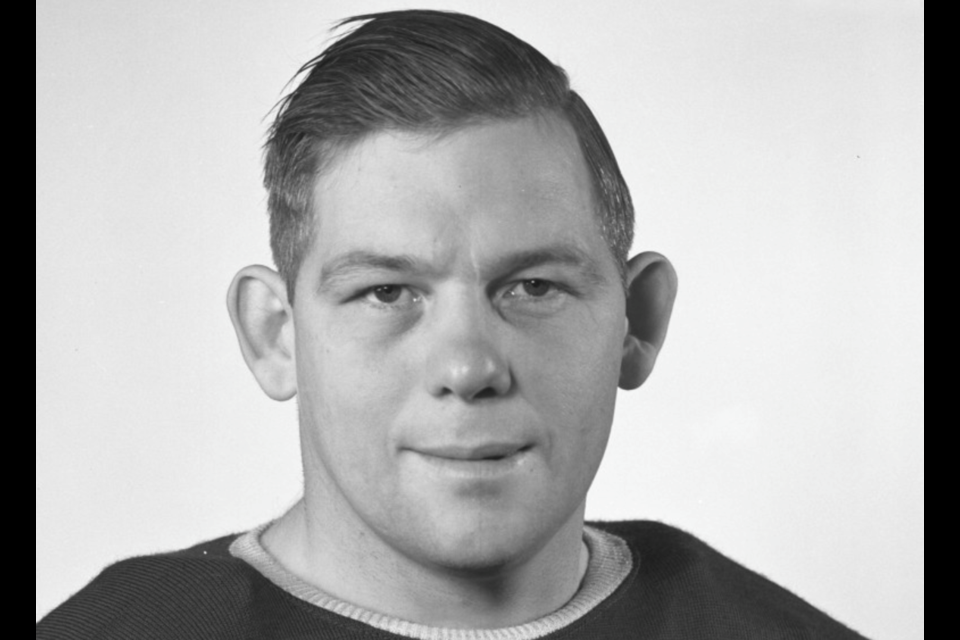The name 'Bucko' originated in Ireland and meant “tough guy.”
It was the perfect nickname for Wilfred Kennedy McDonald. During his 11 seasons playing in the NHL, Bucko McDonald was known as one of the hardest-hitting defencemen ever to patrol the blue line.
McDonald was born in Fergus on Oct. 31, 1911. As a youth he demonstrated great athletic ability. He played baseball for Guelph teams and hockey for Fergus teams, but his first love was lacrosse.
He was fast on his feet and was an unstoppable force on the field. His coordination with ball and stick was uncanny. McDonald played on Fergus and Guelph teams, and then for the Brampton Excelsiors whom he helped to win the Mann Cup in 1931.
McDonald could have been on the Canadian Olympic lacrosse team, but he was barred from amateur participation after playing professionally on a team owned by Conn Smythe, the owner of Toronto’s Maple Leaf Gardens. Unfortunately, the professional lacrosse league collapsed.
Smythe decided to give McDonald a tryout with the Maple Leafs hockey club in 1933. He liked McDonald’s physical style of play, but decided he didn’t skate well enough for the big league. Smythe sent McDonald to the American League Buffalo Bisons.
However, Detroit Red Wings general manager and coach Jack Adams thought McDonald had the makings of a good defenceman, and bought his contract. He sent him to play for Detroit’s farm team, the Olympics. McDonald was called up to the Red Wings for the last 15 games of the 1934-35 season. At five-foot-nine, and 205 lbs., McDonald wasn’t big for a hockey player, but he could hit hard. His devastating body checks quickly made him a favourite with the hometown fans.
McDonald won two Stanley Cups with the Red Wings, in 1936 and ’37. During a semifinal playoff game against the Montreal Maroons, a Detroit businessman named Harry Jacobson who was in the habit of offering Red Wings players cash for goals and assists, told McDonald he’d pay him $5 for every Montreal player he knocked down. That turned out to be the longest playoff game in NHL history, going to 16:30 of the sixth overtime period before Detroit scored for a 1-0 victory. McDonald collected $185 for decking Montreal players 37 times.
During another game, Jacobson put a bounty on Montreal’s star player, Johnny 'Black Cat' Gagnon, who wore number 14. He offered to pay $14 for every time a Detroit player knocked Gagnon down. After the game, in which Gagnon was a marked man, Jacobson went into the Red Wing’s dressing room and said, “Bucko, I think you got him four times.”
McDonald loudly replied, “Hell! I got him five times if I got him once.”
In 1938, deciding he’d made a mistake in not signing McDonald, Smythe finally acquired him for the Maple Leafs for $10,000 and right winger Bill Thompson. Playing defense for the Leafs, McDonald was named to the second All Star team and was on yet another Stanley Cup winner in 1942. In the finals of that series, the Leafs accomplished something that became a franchise legend.
They were down three games to none against Detroit, and came back to win four straight and clinch the championship. It was the first Stanley Cup final to go to seven games.
However, McDonald had proven to be a liability in that series. His former teammates on the Red Wings were too familiar with his moves, rendering him ineffective. The coach benched him along with four other veteran players. The following year, McDonald was traded to the New York Rangers. After two years with the Rangers, McDonald retired from the NHL. He played for one season with the Hull Volants of the Quebec Senior Hockey League.
McDonald was never a high-scoring player. In his entire NHL career he had 35 goals and 88 assists. But that was in an era when defencemen weren’t expected to score goals. In spite of McDonald’s reputation for being a hard-hitter, he was always a clean player and didn’t take many penalties.
McDonald moved to Sundridge, Ontario, where he lived with his wife Lottie (nee Lang). In 1945 he was elected to the House of Commons as a Liberal MP for the riding of Parry Sound. He was re-elected in 1949 and 1953.
After retiring as a player, McDonald coached minor league hockey. One of the boys he coached was named Bobby Orr. McDonald moved Orr from forward to defence and told him to play the game his own way. The former stay-at-home defenceman from Fergus helped make hockey history when he did that, because the kid from Parry Sound went on to redefine the game.
Bucko McDonald died in 1991. His name is in the Bobby Orr Hall of Fame and the Canadian Lacrosse Hall of Fame. In the Ontario Lacrosse Association, the Bucko McDonald Trophy is awarded annually to the highest-scoring player.



